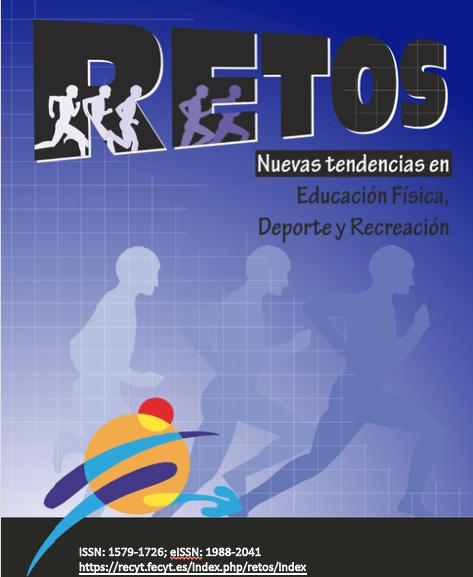Design and validation of a questionnaire in Spanish on sports and Olympic values
DOI:
https://doi.org/10.47197/retos.v47.93726Keywords:
Values; sports; education; Olympism; questionnaireAbstract
The aim of the present research was to design a scale that would allow us to examine the sporting values of Spanish middle and high school students associated to the values generated in the sports sphere. The sample was composed of 1316 students from fifteen high school education centers in Spain. An exploratory factor analysis (EFA) was performed to verify the internal validity of the questionnaire, as well as a confirmatory factory analysis (CFA). Finally, the "questionnaire of sports and Olympic values" is an instrument with which the perception of the values associated with sport by the population between 12 and 18 years of age can be known.
Keywords: Education; Olympism; Sport, teenagers, Spanish language.
References
Borrás, P. A., Palou, P., Ponseti, F. X., Vidal, J., & García-Mas, A. (2009). La educación en valores en la práctica deportiva de los adolescentes: Efectos de una intervención para la promoción de la deportividad sobre la estructura de valores de los deportistas. Revista Española de Pedagogia, 243, 355–370.
Coubertin, P. de. (2011). Olimpismo: Selección de textos. C. I. P. de Coubertin, Ed. Lausanne.
Durántez, C., Pérez-Turpin, J. A., Martínez, A., Mateos, C., Martínez, M. J., & González, A. (2010). Principles of the Olympic Movement. Journal of Human Sport & Exercise, 5(1), 3–14. https://doi.org/10.4100/jhse
Ferrando, P. J., & Anguiano-Carrasco, C. (2010). El análisis factorial como técnica de investigación en psicología. Papeles Del psicólogo.
Font, R., Soler, S., & Calvo, J. (2004). Educación en valores, deporte y nuevas tecnologías. Revista Apunts Educació Fisica i Esports, 78, 83–90.
Gonashvili, A. S. (2015). Systemic-relational approach to issues of morals and fair play ethics in sport sports reserve athletes’ training. Fizicheskaya kultura:vospitanie, obrazovanie, trenirovka, 6, 6-9.
Gouveia, V. V., Milfont, T. L., & Guerra, V. M. (2014). Functional theory of human values:Testing its content and structure hypotheses. Personality and Individual Differences. https://doi.org/10.1016/j.paid.2013.12.012
Heinemann, K. (2001). Los valores del deporte. Una perspectiva sociológica. Apunts Educació Física i Esports, 64, 17–25.
Hernández-Mendo, A., Díaz, F., & Morales, V. (2010). Construcción de una herramienta observacional para evaluar las conductas prosociales en las clases de educación física. Revista de Psicología Del Deporte, 19(2), 305–318.
Hu, L., & Bentler, P. M. (1999). Cutoof criteria for fit indexes in covariance structure analysis: Conventional criteria versus new alternativa. Structural Equation Modelin, 6, 1-5.
Kim, N. I., & Park, S. M. (2017). The relationship between Media Sport involvement experiences and Sports Values and sports participation. International Journal of Applied Engineering Research, 12(20), 9768-9773.
Lleixa, T., Capllonch, M., & González, C. (2015). Competencias básicas y programación d Educación Física. Validación de un cuestionario diagnóstico. Retos, 27,52-57.
Merenda, P. F (2007). Psychometrics and psychometricians in the 20th and 21 st centuries: how it was in the 20th century and how it is now. Perceptual and Motor Skill, 104, 3-20.
Mullan, E., Markland, D., y Ingledew, D. K. (1997). A graded conceptualisation of self-deter mination in the regulation of exercise behaviour: Development of a measure using con firmatory factor analytic procedures. Personality and Individual Differences, 23, 745–752
Muñoz, F. (2004). El deporte como instrumento de transmisión de valores: por un modelo de cohesión social y de tolerancia. Revista de Educación, 335, 153–162.
Nikolau, 2013
Nunnally, J. C. (1991). Teoría pscométrica. México. DF: Trillas.
Rokeach, M. (1973). Rokeach Values Survey. In The Nature of Human Values.
Ruiz, G., & Cabrera, D. (2004). Los valores en el deporte. Revista Educacion, 335, 9–19.
Sánchez-Oliva, D., Leo, F. M., Alonso, D. A., González-Ponce, I., & Chamorro, J. L. (2012). Análisis diferencial de la percepción del desarrollo de valores en las clases de educación física. Retos. Nuevas Tendencias En Educación Fisica, Deporte y Recreación, 22, 9–12.
Schermelleh-Engel, K., Moosbrugger, H., & Müller, H. (2003). Meth.Psychol.Res..pdf. Methods of Psychological Research Online. https://doi.org/10.1002/0470010940
Schwartz, S., Demirutku, K., Dirilen-Gumus, O., Konty, M., Cieciuch, J., Vecchione, M., … Lönnqvist, J. (2012). Refining the theory of basic individual values. Journal of Personality and Social Psychology.
Serrano, G. (1984). Problemática psicosocial de los valores humanos. Boletín de Psicología, 3, 9–46.
Wiersma,, L. D. (2001). Conceptualization and development of the sources of enjoyment in youth sport questionnaire. Measurement in Physical Education and Exercise sciece, 5(3), 153-177.
Downloads
Published
How to Cite
Issue
Section
License
Copyright (c) 2022 Retos

This work is licensed under a Creative Commons Attribution-NonCommercial-NoDerivatives 4.0 International License.
Authors who publish with this journal agree to the following terms:
- Authors retain copyright and ensure the magazine the right to be the first publication of the work as licensed under a Creative Commons Attribution License that allows others to share the work with an acknowledgment of authorship of the work and the initial publication in this magazine.
- Authors can establish separate additional agreements for non-exclusive distribution of the version of the work published in the journal (eg, to an institutional repository or publish it in a book), with an acknowledgment of its initial publication in this journal.
- Is allowed and authors are encouraged to disseminate their work electronically (eg, in institutional repositories or on their own website) prior to and during the submission process, as it can lead to productive exchanges, as well as to a subpoena more Early and more of published work (See The Effect of Open Access) (in English).
This journal provides immediate open access to its content (BOAI, http://legacy.earlham.edu/~peters/fos/boaifaq.htm#openaccess) on the principle that making research freely available to the public supports a greater global exchange of knowledge. The authors may download the papers from the journal website, or will be provided with the PDF version of the article via e-mail.


